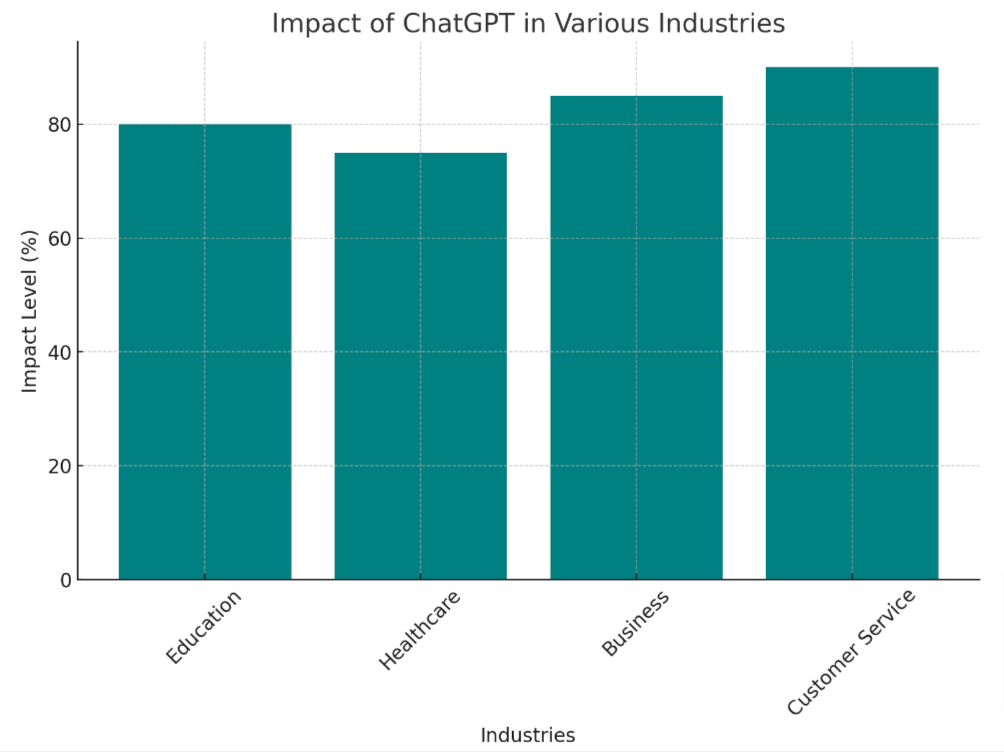The Scholar’s Guide: Understanding Live Chat Through Research and Literature
Do you ever wonder what gold mines of insights lie hidden in everyday live chats? Recent studies reveal that businesses can increase their revenue by up to 25% just by effectively using live chat data.
Today, we’ll dive into how ChatGPT and other conversational agents are unlocking these secrets and transforming industries across the board. Keep reading – it’s going to get interesting!
Key Takeaways
- ChatGPT helps businesses boost their revenue by up to 25% through effective use of live chat data.
- Large Language Models like ChatGPT can understand and respond to human language, impacting various industries like education, healthcare, and business.
- In education, ChatGPT aids in personalized learning experiences and assists with research publications by simplifying data analysis and literature reviews.
- Healthcare applications of ChatGPT support patient engagement and operational efficiency by handling inquiries and administrative tasks.
- Addressing biases, ethical issues, and limitations is crucial for the responsible advancement of AI systems like ChatGPT in multiple domains.
Background of ChatGPT and its Key Milestones
ChatGPT has evolved significantly over time, with key improvements and applications in various scientific domains. Its contributions have been noteworthy in the advancement of conversational agents and market research.
Evolution and improvements
As ChatGPT’s capabilities expanded, its applications in customer service and market research became more sophisticated. Developers focused on refining chat handling skills to ensure smoother, more intuitive conversations with users.
This led to live chat support systems that could provide advanced insights into customer needs and preferences.
Improvements didn’t stop at interaction quality; analytics and reporting features also underwent significant upgrades. These enhancements allow businesses to extract valuable data from their conversational agents, enhancing the overall strategy for engaging clients through generative AI-driven platforms.
With each iteration, these systems have become crucial tools for garnering real-time feedback and driving innovation based on user input.
Applications and growth in the scientific community
Following its evolution, ChatGPT’s role in the scientific community has seen substantial expansion. Researchers are using this advanced AI to streamline data analysis, often plowing through volumes of information faster than traditional methods.
This rapid parsing of data allows scientists to focus on generating new ideas and testing hypotheses with unprecedented speed.
In academic journals, generative AI is transforming how scholarly articles get written, providing initial drafts that researchers can refine and expand upon – a real game-changer for literature reviews.
By assisting in research methodology design or simplifying complex statistical computations for quantitative research, these tools offer a promising boost to productivity and innovation within research circles.
Key contributions
ChatGPT has revolutionized customer service by enabling live chat support to handle a high volume of queries simultaneously. Its advanced insights have also transformed market research, allowing companies to analyze chat data in real-time for better customer understanding.
In academia, scholarly articles now frequently cite the role of conversational agents in enhancing online learning and research methodology. This technology’s data analysis capabilities are assisting researchers in sifting through vast amounts of qualitative and quantitative research more efficiently.
Generative AI like ChatGPT delivers value across various domains by augmenting human skills with its quick responses and deep dive analytics & reporting features. It seamlessly blends into blended studies, providing rich content that supports academic journals in their literature review processes.
As we explore the evolution and impact of these innovations further, let’s examine how Large Language Models perform under scrutiny and what they offer beyond simple text generation.
Features and Evaluations of Large Language Models (LLMs)
Large Language Models (LLMs) boast advanced capabilities such as natural language understanding, text generation, and context-aware responses. These models display a remarkable ability to comprehend and respond coherently to human language input.
LLMs leverage vast amounts of data to enhance their proficiency in understanding complex language patterns. Their evaluation involves assessing performance on various tasks, including question-answering, summarization, and language translation.
Researchers analyze the model’s coherence, fluency, and factual accuracy in producing text outputs across diverse domains.
Furthermore, evaluations encompass measuring the effectiveness of fine-tuning methods that adapt these models for specific tasks or domains. Techniques like knowledge distillation and prompt engineering are employed to tailor LLMs’ outputs for distinct use cases.
The precision of these adaptations is gauged through rigorous testing protocols against relevant benchmarks and datasets within targeted applications before widespread deployment.
Applications of Large Language Models intersect with numerous industries ranging from education to customer service – each harnessing insightful capabilities tailored specifically for their respective domains.
Applications of ChatGPT in Various Domains
ChatGPT has found applications in education, healthcare, business operations, and customer service. To learn more about how this powerful conversational agent is making an impact in these fields, keep reading!
Education
ChatGPT is revolutionizing education by providing students with personalized learning experiences. Through its advanced insights and conversational agents, it supports blended studies, gamified surveys, and online focus groups.
Academic journals and scholarly articles are benefiting from ChatGPT’s generative AI for research publications. Furthermore, it enhances data analysis, literature reviews, and research methodologies—empowering students and researchers to delve deep into qualitative and quantitative research across various educational domains.
The application of ChatGPT in education amplifies chat handling skills in live chat support within academic institutions. With tailored market research capabilities and analytics reporting features, educators can gain valuable insights while ensuring a more interactive learning environment for their students.
Healthcare
In healthcare, ChatGPT has shown promising potential in providing support and assistance to patients. It can be utilized for answering general inquiries, scheduling appointments, and offering basic medical advice.
Moreover, ChatGPT can contribute to improving patient engagement by delivering personalized care instructions and following up on treatment adherence. The integration of ChatGPT in healthcare settings may enhance operational efficiency by managing administrative tasks such as appointment reminders and updates on test results.
Additionally, the technology holds promise in supporting mental health services through active listening features and initial assessment protocols.
With the advancements in natural language processing (NLP), applications of generative AI like ChatGPT are becoming instrumental tools for patient interaction and support within the healthcare domain.
Business Operations
ChatGPT has found extensive applications in business operations, transforming customer service and market research. It enables automated live chat support, improving chat handling skills and providing advanced insights through analytics and reporting features.
Additionally, businesses can utilize generative AI to enhance online focus groups and gamified surveys, obtaining valuable quantitative and qualitative research for informed decision-making.
Large Language Models like ChatGPT have revolutionized academic journals and scholarly articles by facilitating data analysis, literature review, research methodology, findings, and publication of new insights.
Customer Service
Customer service teams can leverage ChatGPT for live chat support, enabling seamless and efficient interactions with customers. By harnessing the advanced insights and analytics & reporting features of generative AI, companies can enhance their chat handling skills and provide personalized assistance to address customer inquiries effectively.
With its market research applications, conversational agents powered by ChatGPT also facilitate online focus groups and gamified surveys for gathering valuable feedback, contributing to improved customer satisfaction and retention.
Businesses utilizing ChatGPT in customer service operations benefit from its ability to adapt responses based on real-time data analysis while ensuring consistent quality across various channels.

Challenges, Ethics, and Limitations of ChatGPT
ChatGPT presents challenges in dealing with biases and ethical concerns, particularly in healthcare and academia. However, potential solutions and future scope for improvement are also being explored.
Biases and limitations
Biases and limitations can arise in the use of ChatGPT and similar large language models. Biases may stem from the training data, leading to skewed outputs that reflect societal prejudices.
Moreover, limitations exist in healthcare applications due to potential inaccuracies in medical advice. Academic researchers also face challenges with biased literature reviews when using generative AI for research papers.
In addition, ethical concerns persist in utilizing conversational agents for customer service, where privacy and data security must be carefully managed. In market research, biases may influence the outcomes of blended studies conducted through online focus groups or gamified surveys.
Ethical concerns in computer science
Ethical considerations in computer science involve ensuring the fair and unbiased use of AI models like ChatGPT. It’s vital to address potential biases, discrimination, and privacy breaches that could arise from deploying such technologies across various domains.
Transparency and accountability in the development and deployment of large language models are crucial to mitigate ethical concerns related to data usage, algorithmic fairness, and user consent.
Furthermore, understanding the impact of AI on different sectors highlights the need for responsible innovation. As these systems increasingly influence decision-making processes in fields such as healthcare and customer service, it’s imperative to uphold ethical standards by prioritizing user well-being, safeguarding sensitive information, and actively addressing any biases or limitations that may arise.
Limitations in healthcare and academia
In contrast to the ethical concerns in computer science, limitations in healthcare and academia regarding the application of ChatGPT have been identified. While the potential for utilizing large language models (LLMs) such as ChatGPT in healthcare and academia is vast, there are challenges to overcome.
In healthcare, issues relate to privacy concerns, sensitive data handling, and ensuring accurate medical advice provision. Similarly, within academia, there are limitations surrounding research bias prevention and maintaining academic integrity when using generative AI technology such as ChatGPT.
These challenges must be addressed to ensure that the integration of ChatGPT in healthcare and academia enhances rather than compromises these vital domains. Efforts toward mitigating biases while harnessing the power of LLMs like ChatGPT will play a crucial role in realizing their full potential impact on patient care and scholarly contributions.
Potential solutions and future scope
To address the challenges faced by ChatGPT, ongoing research is exploring ways to mitigate biases and limitations in large language models. Ethical frameworks and guidelines are being developed to ensure responsible deployment of generative AI systems.
Future applications in healthcare and academia will benefit from improved data handling and verification processes to enhance reliability. Furthermore, advancements in model interpretability will enable better understanding of the decision-making process behind ChatGPT’s responses, contributing to increased trust and transparency in its usage across various domains.
In addition, future scope lies in refining chat handling skills through continuous training methods for customer service representatives. Market research methodologies may evolve to incorporate gamified surveys and online focus groups for gathering advanced insights into consumer behavior.
Conclusion
In conclusion, the evolution of ChatGPT has led to significant advancements in various domains. Its applications in education, healthcare, and business operations have reshaped customer service interactions.
As we navigate its limitations and ethical concerns, potential solutions are on the horizon for broader usage. The future looks promising for deep diving into live chat insights through research papers and articles.

